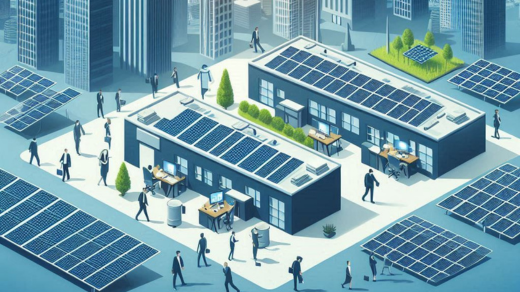Business Solar Panels – The Ultimate Guide to Commercial Solar Solutions

In today’s rapidly evolving energy market, business solar panels have emerged as a crucial investment for companies seeking to reduce operational costs and enhance sustainability. This comprehensive guide delves into the myriad benefits of commercial solar panels, the installation process, and the long-term advantages of adopting solar energy for businesses.
Why Businesses Should Invest in Solar Panels
Cost Savings
One of the most compelling reasons for businesses to install solar panels is the significant cost savings. Solar energy reduces reliance on traditional electricity sources, leading to lower utility bills. Over time, the investment in solar panels pays off through reduced energy expenses.
Environmental Impact
Adopting solar panels for business operations contributes to a greener planet. Solar energy is clean and renewable, producing no greenhouse gas emissions. Companies that prioritize sustainability can enhance their brand image and appeal to eco-conscious consumers.
Energy Independence
Commercial solar installations provide businesses with greater energy independence. By generating their own electricity, companies can mitigate the risks associated with fluctuating energy prices and supply disruptions.
Incentives and Tax Benefits
Governments worldwide offer various incentives and tax benefits to businesses that invest in solar energy. These can include grants, tax credits, and accelerated depreciation, making the initial investment more manageable and financially attractive.
Understanding Commercial Solar Panels
Types of Solar Panels
Businesses can choose from several types of solar panels, each with its own advantages:
- Monocrystalline Panels: Known for their high efficiency and sleek appearance, these panels are ideal for businesses with limited roof space.
- Polycrystalline Panels: Slightly less efficient but more cost-effective, making them a popular choice for larger installations.
- Thin-Film Panels: Flexible and lightweight, these panels are suitable for unconventional surfaces and large-scale projects.
Components of a Solar Panel System
A commercial solar panel system comprises several key components:
- Solar Panels: Capture sunlight and convert it into electricity.
- Inverters: Convert direct current (DC) generated by the panels into alternating current (AC) used by most businesses.
- Mounting Systems: Secure the panels to roofs or the ground.
- Monitoring Systems: Track the system’s performance and ensure optimal operation.
The Installation Process
Site Assessment and Design
The first step in installing commercial solar panels is a thorough site assessment. Professionals evaluate the available space, orientation, and shading to design an optimal system. This stage includes creating detailed plans and obtaining necessary permits.
Installation
The actual installation involves mounting the panels, setting up inverters, and connecting the system to the electrical grid. Experienced technicians ensure that the installation adheres to safety standards and maximizes energy production.
Inspection and Commissioning
After installation, the system undergoes rigorous testing and inspection to ensure it operates correctly. Once approved, the system is commissioned, and the business can start generating its own electricity.
Long-Term Benefits of Commercial Solar
Return on Investment (ROI)
Investing in solar panels offers a substantial return on investment. While the initial cost can be significant, the long-term savings on energy bills, combined with financial incentives, result in a strong ROI.
Increased Property Value
Properties equipped with solar panels often have higher market values. Buyers and tenants are increasingly looking for energy-efficient buildings, making solar installations a valuable asset.
Resilience and Reliability
Solar energy systems can provide backup power during outages, enhancing the resilience of business operations. Advanced systems with battery storage ensure that critical functions remain operational even when the grid is down.
Corporate Social Responsibility (CSR)
Implementing solar energy solutions showcases a company’s commitment to corporate social responsibility. It demonstrates leadership in sustainability and can significantly boost the company’s reputation and stakeholder relations.
Case Studies of Successful Commercial Solar Installations
Retail Chains
Several retail chains have successfully integrated solar panels into their energy strategies. By installing panels on store rooftops, these companies have reduced their energy costs and promoted their commitment to sustainability to customers.
Manufacturing Plants
Manufacturing facilities, with their large roof spaces, are ideal candidates for solar installations. These plants benefit from significant energy savings, which can be reinvested into production improvements and innovation.
Office Buildings
Modern office buildings are increasingly turning to solar energy to meet their electricity needs. Solar panels help reduce operational costs and create a healthier work environment by reducing reliance on fossil fuels.
Future Trends in Commercial Solar Energy
Technological Advancements
Advancements in solar technology continue to improve efficiency and reduce costs. Innovations such as bifacial panels, which capture sunlight from both sides, and improved energy storage solutions are set to revolutionize the market.
Integration with Smart Grids
The integration of solar panels with smart grid technology allows for more efficient energy management. Businesses can optimize their energy use, reduce costs, and contribute to a more stable and resilient grid.
Policy and Market Trends
Government policies and market trends increasingly favor renewable energy adoption. Businesses that stay ahead of these trends can benefit from early adoption incentives and position themselves as leaders in the transition to sustainable energy.
Conclusion
Investing in commercial solar panels is a strategic decision that offers numerous benefits, from cost savings and energy independence to enhanced sustainability and corporate reputation. As technology advances and market conditions evolve, businesses that embrace solar energy will be well-positioned for long-term success.




